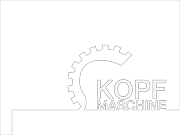-
The Video Jul 2011
Drumroll
Finally the video is here! It captures the essence of this years EuRuKo, the venue, the people and the speakers, including a HD version of the “Ruby Ruby Ruby” performance. Thanks Alex for this gem.
Euruko 2011 Berlin from Alexander Lang
-
EuRuKo 2011, a review Jun 2011
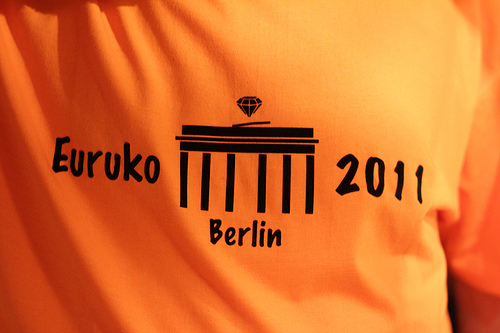
It all started with an email to the mailing list of the Ruby user group in Berlin proposing to bring the next EuRuKo home. With perfect timing - or others would say - seconds from departure to Krakow we managed to print a couple of T-Shirts that mainly drew attention because of their bright colors :). During the closing ceremony, enough of our supporters survived the awesome conference and the long nights in Krakow to get up on stage together to sing a Berlin song. We did that so lovely, so loud and so wrong that the competition surrendered to make us stop singing! So the famous gong was passed on, we went back to Berlin and started organizing right away.
Back home we were, energized with the idea of organizing an amazing conference. We wanted to continue the success of the past - like Paul (last year’s head of the organization team) said: “If you are doing it wrong, you can kill this conference”. Things started to get real. In the beginning, a lot of people signed up to help but dropped out equally fast. No one to blame here, it’s a natural process that you just need to take into account. The big things were clear from the beginning and we assigned them to organizing members. We needed a location, speakers, Wi-Fi, catering, a website, a design, a logo and countless other things. First and foremost, we needed money to do that.
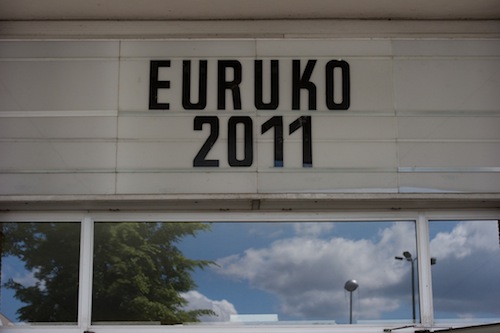
As it turned out, money was not a problem in the beginning. After prepping a nice sponsorship brochure, that probably nobody of the local sponsors needed to see, we quickly reached an agreement with our friends at wooga, soundcloud, moviepilot and scalarium. The introduction of supporter tickets made it possible to have smaller local sponsors and still keep the regular ticket price low. Later on, bigger companies approached us for sponsorships, but we turned down their money, because we wanted to limit ourselves and keep EuRuKo a conference with its special characteristics: small in size but great in performance!
More decisions had to be made that would shape the face of the conference. That was probably the hardest part. We wanted to keep the conference small to preserve its character but at the same time we wanted to give more people a chance to attend the conference - a constant topic of discussion among the organizing team!
As the unexpected crazy demand for the tickets showed, we couldn’t make it big enough. It was also too much for the ticket processor, but gambling tickets in the future isn’t a good option either. However, the Rubyists showed their great sense of community again by the spontaneous organization of EuRuCamp as an alternative for those who couldn’t get a ticket. So a big THANK YOU to the the EuRuCamp team and all people that helped.
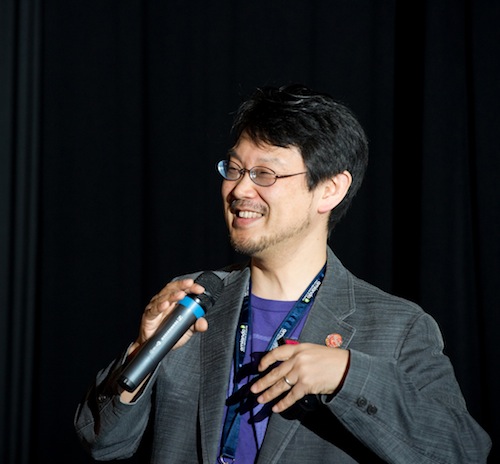
So next to size, what matters is greatness in performance - to achieve this we needed the right mix of speakers. EuRuKo is a community conference so we wanted to give new speakers a chance of a bigger audience. At the same time we selected very well known speakers to ensure the great quality expected from EuRuKo: a quality expected from speakers and keynote speakers! Traditionally, Yukihiro “Matz” Matsumoto, the creator of Ruby, who is an important part of every EuRuKo, has the privilege to give the first keynote. Learning from his experience was a great honor and we were happy to welcome him in Berlin!
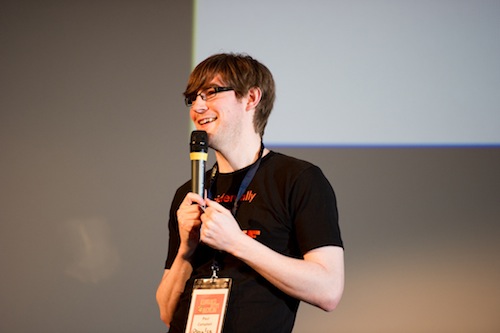
The second keynote was held by Paul Campbell, certainly not a classical keynote choice: But what he lacks in age he makes up for in passion for Ruby and great speaking credibility. The reactions we got during his keynote were as controversial as we hoped them to be:
“Who is the keynote speaker today, and why’s he so unprepared? #EuRuKo (what’s he done, why’s it a keynote, etc?)” - @codebreaker - see the tweet
“Awesome keynote by Paul Campell this morning at #euruko; perhaps the most inspiring and empathetic I’ve ever attended.” - @marcolz - see the tweet
Yes, we questioned the classical keynote speaker choices and think we did good! Paul showed us, and at least part of the audience, that all you need is passion and finesse to inspire people.
Of course, the talks should be special too, talks that would unlikely be seen at any other conference, talks we haven’t seen before, talks we would like to hear about, talks about Ruby and the things our community values.

But certainly apart from the high quality of talks, there is more to come - first and foremost a decent location. If you happened to attend Funconf, SchnitzelConf or Scottish Ruby Conference you have noticed that organizers getting more creative in finding venues, which form the conferences’ character. Thinking about a location that would represent Berlin and its diversity we had to find a place big enough, but also with enough history and charisma to be good enough! And with the Kino International we found the perfect location, perfect in size, enough history and plenty of charisma. It allowed us to have a single track conference with plenty of room for everybody. The acoustics were amazing and the screen together with the kick ass projector were simply awesome.
The last month before the conference was the most hectic one, suddenly problems of all kind started to come up. Part of these were rookie mistakes on our side, some were just bad luck. The reserved party location was given away without notice, no affordable catering could be found for the weekend, important documents went missing and unforeseen expenses were presented to us. These expenses forced us to cancel the planned BBQ :(. But we managed to get everything in place, and suddenly the first day of conference started. Following Paul Wilsons advice - curator of the Scottish Ruby Conference - we just went with the flow and directed the chaos.
The probably most chaotic incident was finding the main party location. Believe us, even the organizers that haven’t been there before were so surprised that a location can be this remote in the middle of Berlin. As @inecas fittingly suggested: “Lets rename Tante Kathe to the restaurant at the end of the universe”. Luckily we didn’t loose anybody thanks to Twitter geo caching :). It was definitely a very Berlinesque location. We hope you liked its authentic charm and the free beers that we managed to organize spontaneously on site as a small relief for the canceled BBQ.

One thing made us very happy and that was the Internet at the venue! Thanks to the guys of New Thinking Communications and a helping hand from the Chaos Computer Club we got a rock solid Wi-Fi on site. Here are some small facts: The venue was brought online via 360 MBit directional link that was backed by a direct 1GB Fibre access. Installing that was a great adventure as you can see in these photos.
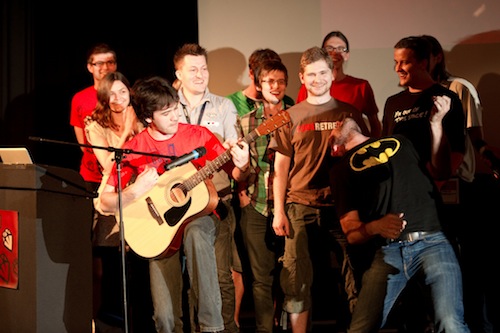
Similar to last year’s conference, it ended with a musical performance and the passing of the gong to the new team of organizers. EuRuKo 2012 will be in Amsterdam and according to the t-shirts, it will be the last one. So they better make it count.
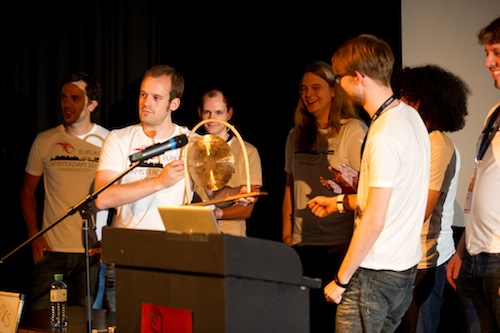
EuRuKo 2011 was an amazing experience. For us it was a great time, we learned a lot about organizing a conference and decided to put the skills we acquired to good use for future projects. We hope you will keep great memories of the Euruko 2011 in Berlin too. We preserved its traditions by keeping it small in size and great in performance but gave it a distinct ‘Berlin’ character.
Last but not least we would like to say thank you. Thank you for attending the conference. And also special thanks to:
- The speakers, EuRuKo would be impossible without them
- The EuRuCamp team for organizing this great side event
- Our supporters
- Our main sponsors
- New Thinking Communications for the kick ass WiFi
- The Computer Chaos Club for helping us out with the internet
- Mathias Meyer for being our photographer. You can find his photo sets here and here
- Alexander Lang for filming
- Oli, the sound guy
See you 2012 in Amsterdam.
The Euruko 2011 Team
Lukas, Clemens, Christoph, John, Patrick, Tim, Nico and Thilo
-
Tonight's conference party May 2011
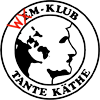
We invite you to party with us and all the EuRuCamp visitors at “Tante Käthe”. This location is a pretty unknown jewel of Berlin located right inside the Mauerpark. As hard as it is to find, as fun it will get. Unlike announced on the “Agenda”, there will be no BBQ. We’re sorry, but please pick up some food on your way.Getting to the location might be a bit hard. We try to make it easy for you, by providing the possible routes on our Visitor Info Map. We will also provide flyers with exact directions.
Please take note of the following map, the location is easy to find if you follow the paths:
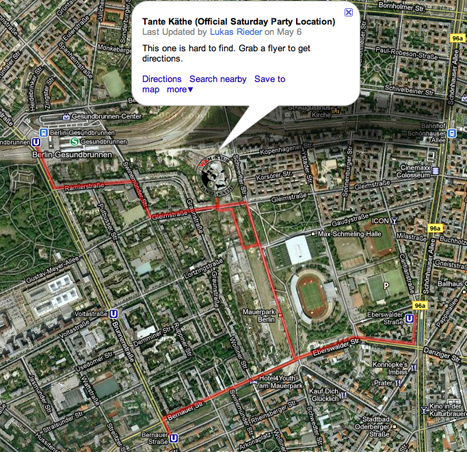
-
Tonight's pre conference meetup May 2011
As announced on the agenda, there is a pre conference meetup tonight (Friday, May 27th) at c-base starting around 9 PM.
You can find the location on the Visitor Info Map. The closest subway/S-Bahn station is called “S+U Jannowitzbrücke”. You need to go through the entrance of this house.
If you have an Android phone or any other flash enabled device, you can have a look at the street view of the entrance here.
Instructions: This is how it looks like from the outside. You go inside the entrance into the second backyard. On the left side of the second backyard there is another passage. Take the first door right at the beginning of the passage and you’re here.
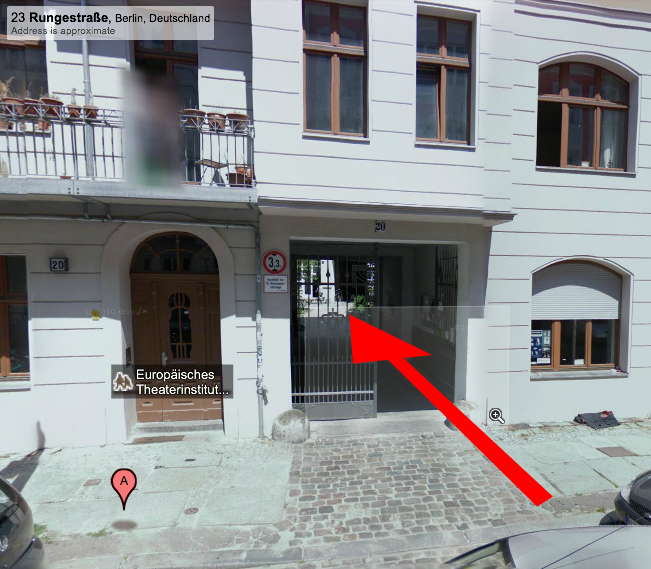
-
Such Great Heights May 2011
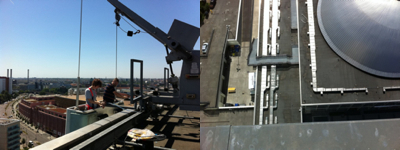

Since the location’s internet connection does not offer the bandwidth that we consider worthy for you, our very own John “Fearless” Bader climbed great heights today, so that we can enjoy quality internet during the conference.
You can see more pictures on John’s Flickr stream, best viewed with this soundtrack:
-
It's going to be big May 2011
Yesterday we tried out the projector. It is able to display a stunning 1920x1080 resolution (16:9 format). As for the canvas, let’s say it is going to be just big enough. But see for yourself:
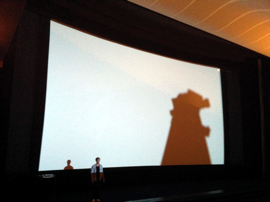
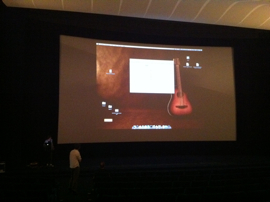
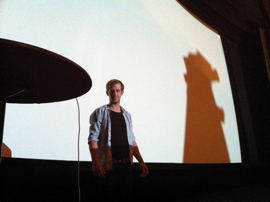
On that note, we advise all speakers to enlarge their presentations into a widescreen format with a high resolution. We tried 4:3, it works, but it should only be considered as a fallback.
We are excited to see everyone on Saturday.
The EuRuKo 2011 Team
-
EuRuKo 2012 needs you May 2011
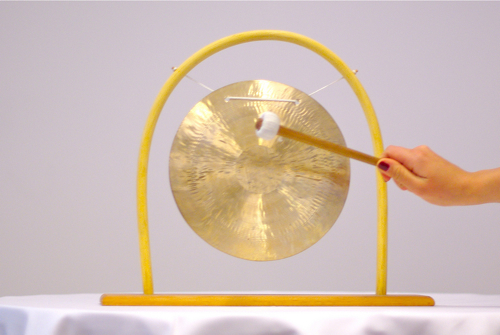
Don’t worry, we’ll refrain from showing a picture of uncle Sam. However, we would like to point out again, that EuRuKo is an event organized by volunteers from the Ruby community. Every year it takes place in a different city somewhere in Europe. That means: EuRuKo 2012 needs a home.
Traditionally, the attendees vote where the next conference will take place. Last year we created t-shirts and even sang on stage for the opportunity to create a great Ruby event in Berlin just for you (and of course to get our hands on the gong).
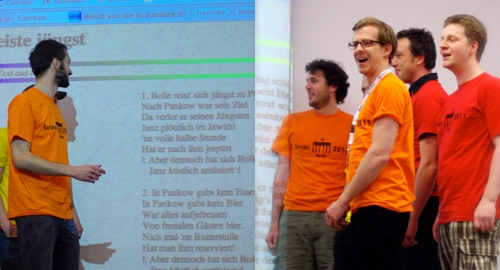
So what about next year? Who will give the gong a new home? Who will keep alive the EuRuKo tradition and organizes an awesome EuRuKo 2012?
This is your chance to shine and give something back to the community. We’ll expect your proposals at the end of the conference.
-
Meet the sponsors: scalarium May 2011
Scalarium.com is one of the main sponsors of EuRuKo 2011 and we would like to talk a bit about what we do.
It all started with the guys at Peritor working hard on consulting gigs and helping people move their applications to Amazon EC2. Doing this is complex and involves a lot of repetition. Also Amazon EC2 lacks some fundamental capabilities like automatic replacement of dead hosts, easy configuration, or application deployment support. So Scalarium was born to fill that gap. Running in production for over a year now, Scalarium now hosts some pretty big and popular sites. Scalarium is a management layer on top of EC2 that automates the hell out your machines and gives you:
- Configuration with Chef
- Auto healing and replacement of failed hosts
- Auto scaling by time of day or load on your machines
- Build-in deployment and logging
- Extensive monitoring and tracking
The most important component of Scalarium is the local agent running on every machine. It communicates the local state up to the main repository and responds to changes by executing Chef runs. Scalarium uses Chef to form servers into your desired state. What differentiates Scalarium from a simple Chef server setup is that Scalarium generates life-cycle events (like setup, deployment or state change) and pushes them down to all machines rather then relying on Chef server pull. By having multiple life-cycle events you can tell Scalarium what to do when servers come or go or how to respond to a new application server (e.g. by adding it to the load balancer!). Also Scalarium takes care of EC2, abstracting the API & co away. You model your architecture by using build-in roles (like Rails app server, MySQL server, load balancer or Node.js app server) or by creating custom definitions. Thanks to the power of Chef, Scalarium can automate anything scriptable.
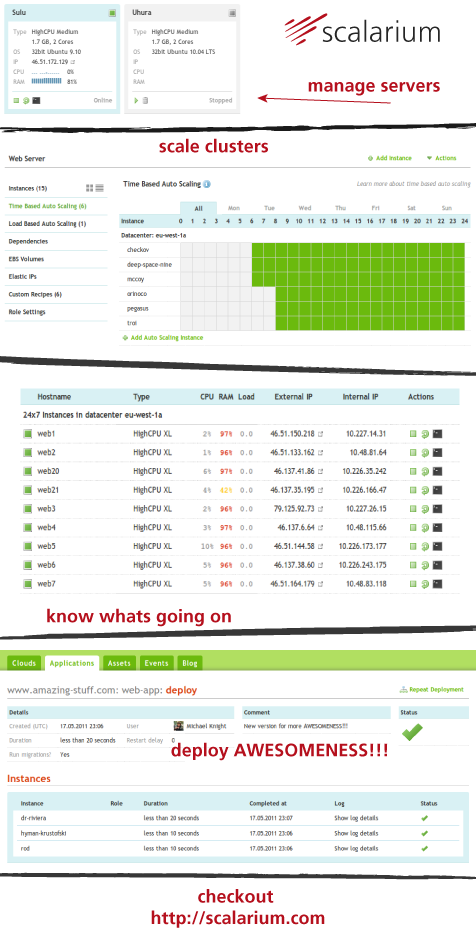
Using the provided auto scaling mechanisms many clients scale down machines during the night and boot them over the day. This saves a lot of money as you only pay for what you are actually using.
Our team is based in Berlin and apparently trusted so much that we are the save-keeper of the EuRuKo gong.
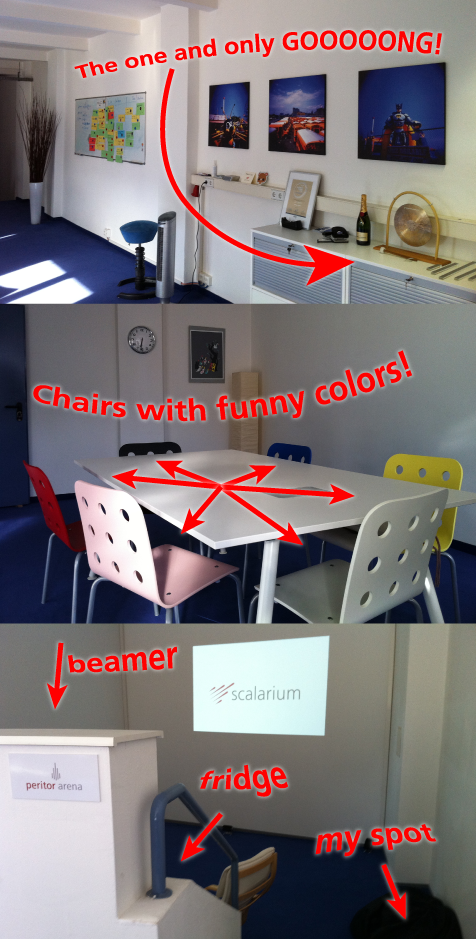
We work with Rails, Nanite, AMQP, RabbitMQ, CouchDB, Redis, and Chef and spend our time hacking Ruby backend code, writing Chef recipes for exciting new tech like Node.js or complaining about various Linux distros. Oh, and we are migrating our frontend to Backbone.js too. If you are a Ruby developer or a Linux sysadmin looking for a job maintaining hundreds of servers, drop us a line at jobs@scalarium.com.
-
Meet the sponsors: SoundCloud May 2011
Hey there! My name’s Rany and I’m pleased to announce that SoundCloud will be one of the main sponsors of Euruko this year.
Since its creation in 2007, SoundCloud has run on Rails. We began as a small music sharing platform in private beta, and have grown to become an increasingly essential site for audio sharing on the web with over 4 million users.
Scaling is obviously a big concern. We are not only utilizing proven solutions, but also experimenting with new approaches.
- SoundCloud.com and the API currently run Rails on this stack: Varnish, Nginx, HAProxy, Thin and RabbitMQ
- Assets are served from S3 and we use EC2 for worker tasks.
- We’re experimenting with NodeJS and Backbone.js on our Mobile Site
- Most of our data is served from MySQL, where we have a classic Master/Slave set-up.
- Cassandra to serve the Dashboards (you can hear Sean talking about that at Rug_B).
- Ruby also comes into play in how we manage our infrastructure. As we continue to grow we’ll be adding many new machines. To prepare for this we use Chef for our configuration management.
- For testing purposes, we use RSpec, Cucumber, and Selenium. Our test suite has grown too large to run locally, so we’ve decided to run it on Amazon EC2, where we fire up a lot of instances to run the test suite in parallel. Jenkins CI manages our continuous integration of various apps.
Check out some of our experiences on our Backstage blog. For example, here’s an amazing post on how we failed with MongoDB!
We have a strong focus on our API and its developer ecosystem. To assure the quality of our API and its documentation, we actually eat our own dog food: the iOS, Cocoa and Android development happens in-house. We have also launched a shiny, new developer portal making it easier for developers to get started. Our App Gallery, currently showcases over 150 apps by external developers.
Currently there are 30 developers running SoundCloud from Berlin. All major development takes place at “Silicon Rosenthaler Platz” in Mitte. Minor development takes place on our rooftop terrace, and we also have satellite offices in San Francisco and London.
So come say hi and have a beer with us at Euruko! There will be at least four of us Clouders in attendance - Tobi, Sebastian, Daniel, and me. Did I mention that we’re hiring like crazy?
Also, if you were unable to get a ticket to Euruko, we will also be attending [Music Hack Day Berlin] (http://berlin.musichackday.org/2011/) at MTV Networks, to hack on new music apps. Awesome ruby hackers are most welcome!
-
There will be lightning May 2011

As you can see in our agenda there are going to be two slots for lightning talks. We are big fans of lightning talks because we think that a lot of interesting things come out of it.
So if you have something you would like to present, this is your chance. There is only one rule: Your talk must fit into 5 minutes including questions. For those of you who remember last year’s gong, that’s what you are going to hear after the 5 minutes are up, adding the thunder to your lightning.
So how does one apply to give a lightning talk? There will be a whiteboard at the conference where everyone can add talks. It will be first come first serve.
-
The Keynote speakers May 2011
We are super excited to announce our two EuRuKo keynote speakers
- Yukihiro Matsumoto (Matz)
- Paul Campbell
Having the creator of the Ruby language as a speaker is a great honor for us. His regular appearance at the EuRuKo speaks of his dedication to the community while his humble and inspiring talks always left a lasting impression. Matz’s presentation at last year’s EuRuKo was one of the highlights and his We are Blave slide became legendary.
Paul is an amazingly talented speaker and his slide style make his talks even more exceptional. He has impressed us where ever we saw him speaking throughout the last year and we are anxious to see what he has prepared for us this time.
-
Meet the Sponsors: moviepilot May 2011
Hey there, my name is Jannis and I’m responsible for things like coffee and recommender systems at moviepilot.de and I’d like to tell you something about us.
In 2007 two guys, let’s call them Tobi and Jon, decided to leave the movie production game and start an online movie community. Moviepilot is a fast growing European movie community with an innovative social utility - offering the first completely personalized entertainment guide in Europe. We provide detailed information to more than 50,000 movies to which we are able to deliver individual predictions on how the user will like a movie.
Upon registration, each user creates a short taste profile by quickly rating a few films. We then look for those users whose tastes in movies are most alike and are able to give individual predictions for movies and make recommendations that pay off. By now we have over 100,000 registered users, 120,000 celebrities and more than 10 mio. film ratings in the database which makes us Germany’s largest film-community.

Like well known Beautiful Minds, we like to draw on things.
But all this started out circulating excel sheets amongst the employees to gather info about their taste in movies. Then we got our friends to fill out the questionnaires and tell the moviepilots all about the films they like. The questionnaires were then sent on to friends of friends but we started wondering whether this approach would scale to hundreds of thousands of users.
The hackers at moviepilot had to figure something out. In 2007 moviepilot’s first recommender engine was born, made with ruby on rails and MySQL. But as the site began to gain traction in 2008, the MySQL based recommender system just didn’t cut the mustard anymore. I was finishing my master’s degree in computer science at that time, and was looking for an interesting place to write my thesis.
As part of my thesis I built moviepilot’s next generation recommender engine, a custom RESTful webservice that was optimized for performance and integrated into the existing ruby on rails & MySQL infrastructure through background jobs (resque FTW). The amount of available data still grows every day, and this system allowed us to generate awesome movie recommendations in no time (at some point we actually built a real-time recommender engine).
We quickly realized that in order to make the most out of this never ending well of data we needed
an adultscience. There was no way I could deal with analzying movie recommendations, a huge archive of movie news, and very detailed semantic, emotional, geospatial movie annotations all alone, so we teamed up with the Technical University of Berlin to do some research together.
Moviepilots hacking away (while browsing moviepilot recommendations on the T-Home set top box in the background)
In 2009 I went to New York to attend the most important conference in this field, the ACM Recommender Systems Conference (RecSys for short), and it was great. I didn’t want to be passive and just watch other people do cool stuff, though, so in 2010 we held a full day workshop about context aware movie recommendations at the RecSys 2010 in Barcelona. We did this together with our great partners at the DAI-Labor of the Technical University in Berlin.
Just last week we received confirmation that our proposal for another full day workshop at the RecSys 2011 in Chicago had been approved. Yay! Also, we’re organizing the Movie Hack Day 2011 in Berlin in June (see http://moviehackday.com) so why don’t you come join us?
So what’s life at moviepilot like today? The developer team has grown and we’re quite international now, I’m sitting at a big desk with a Swedish data mining expert who is writing his PhD at moviepilot and next to a Catalan graph database guru. Together with Ben, our CTO and Andreas, a fellow developer, I hack away on our new product and at least once a week I meet up with the guys from the DAI-Lab to work on our research project on context aware movie recommendations.
I will be at the conference on the 28th and 29th of May so come and talk to me.
TL;DR
We love data, science, visualizations and hacking! Come join us, we have open PhD positions with the TU-Berlin and are looking for developers… mailto:jobs@moviepilot.com
-
Visitor info online Apr 2011
As some questions are always the same when visiting a city we like to give you some answers before you even asked them in our new visitor info section. There you find tips like how to find the venue, where to stay and how to get around. If you have further question feel free to ask us via contact(at)euruko2011.org.
-
Here are the speakers Apr 2011

Hi all,
we kept you on tenterhooks for quite some time, we know. First, thanks again to all who submitted a talk, it was really hard to choose as quality was great and subjects varying. It took us some time and lengthy discussions to go through the nearly 100 submissions to get a unique Euruko 2011 mix.
Before announcing the first speakers we would like to give you an overview of what to expect this year. The most fundamental decision we took early on was to focus on ruby. We rejected great speakers and topics, which didn’t deal with ruby, but it’s very likely that you will see these talks on other occasions. We also think that the Euruko should be a stepping stone for interesting new speakers, so instead of playing it safe we accepted quite a bunch of them and some veterans have to take a break. And last but not least we wanted diversity: You can expect hardware hacking, bit shifting, game scaling, movie making, data pushing and more.
So go and checkout what Pat Allan, Ben Langfeld / Ben Klang, Nick Sutterer, Bodo Tasche and Lourens Naudé will talk about in our new speakers section.
We will announce more speakers in the following days.
– Update 05. April
You can now find info about the talks of Federico Brubacher, Thorben Schröder, Karel Minařík and Kornelius Kalnbach
– Update 08. April
We getting close to the finish. Here are the latest speakers: Paolo Perrotta, Elise-Huard, David Calavera and José Valim.
– Update 12. April
As good as done. Here are the last speakers: Julik Tarkhanov, Jesper Richter-Reichhelm, Mateusz Drożdżyński. Grand finale, keynote speakers.
-
Meet the Sponsors: wooga Mar 2011
wooga is one of the main sponsors for the conference this year, and to introduce the company, Tim Lossen (one of the organizers of the conference and a lead engineer at wooga) sat down to talk about the working atmosphere in wooga’s Berlin HQ and his experiences with using Ruby with social games.
First of all, Tim specifically works on one of wooga’s games, “Happy Hospital”. He is part of a cross-functional team that consists of product managers, designers, flash developers, and backend developers — twelve people in total. He is responsible not only for developing new game features, but also keeping everything running smoothly 24/7 — in short, you could say he’s responsible for devops.
The setup is as follows: the backend is a rails app, running on a small cluster with a fairly standard configuration: haproxy as the load balancer, nginx as the web server and unicorn for the app server. The interesting part is that the team decided early on to ditch MySQL and use Redis as the main database. According to Tim, “that decision was awesome for performance, but brings some unique challenges as well.” One of the primary languages in use is of course Ruby, because “game development is always moving pretty quickly. We do weekly iterations, so we need a language that doesn’t stand in our way. When you’re working with a small team and a short time frame, you want your language to work with you, not against you”. Some people might say that Ruby is too slow for this setup — but while Ruby is indeed slow, that has never proven to be a problem for the team.
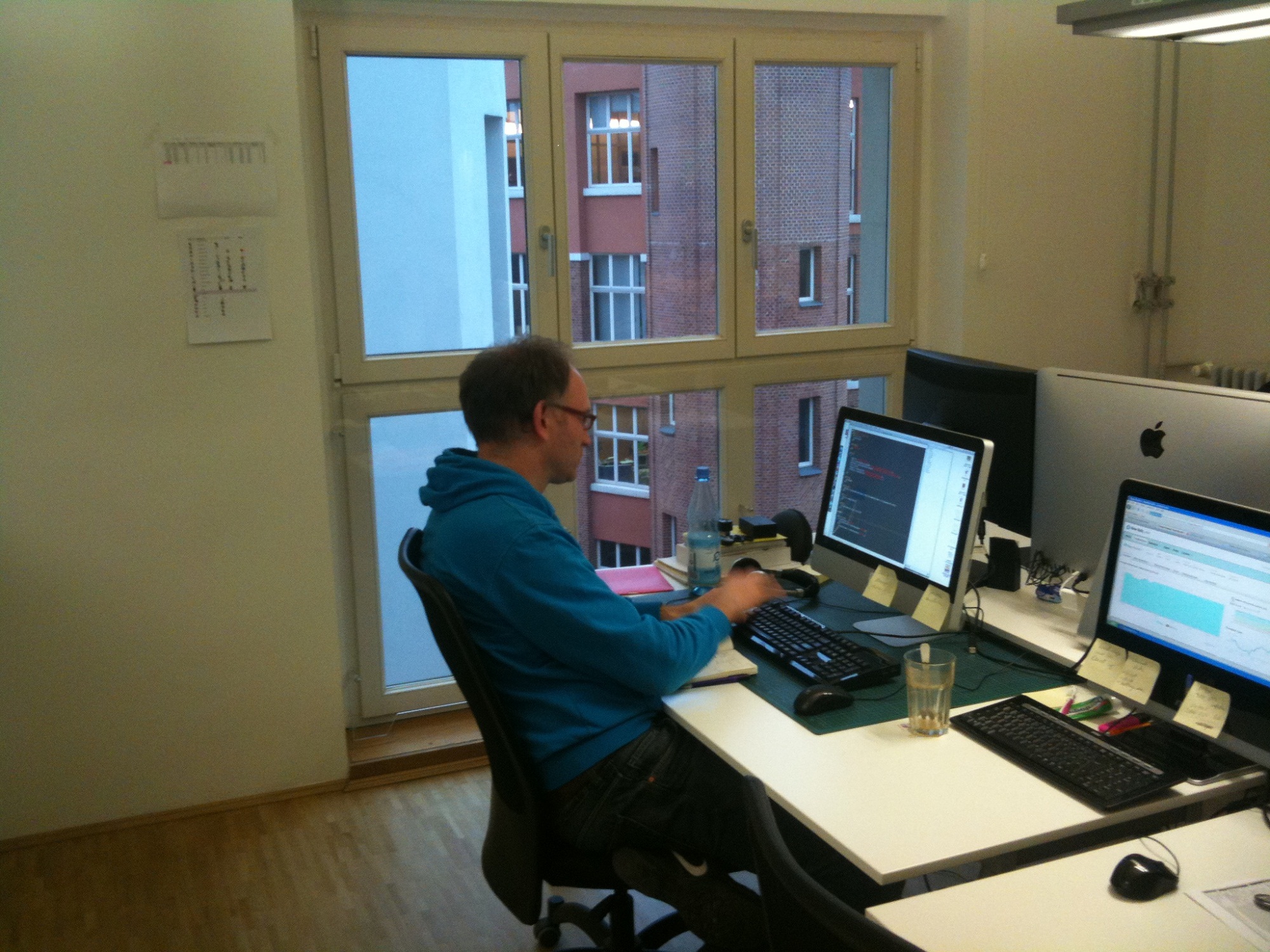 He even has a window, with twice the legal minimum space required by German law for a
He even has a window, with twice the legal minimum space required by German law for a farm animalbeloved programmer!
But what is really awesome about working at wooga isn’t necessarily the setup the team gets to work with — but rather that they got to choose exactly how they wanted to set everything up. No one on the Happy Hospital team has ever felt like they were being micro-managed and forced down a specific path — which is great, because the last thing any programmer wants is to have a non-technical person breathing down their necks, telling them what to do. But with this kind of freedom comes a great deal of responsibility. The Happy Hospital team knows that they are responsible for making sure their decisions actually work, and that they can carry out the choices they have made.
Each game at wooga is started off as a greenfield development. This means that the people who best know what they’re doing have the freedom to make a lot of the technical decisions — from selecting the programming language, framework and database, to choosing the hosting provider — and as long as they can reasonably justify their choices, there is no pressure to conform to a preset path.
The last thing Tim talked about, is that the most challenging part of building social games is the sheer size of everything. Everyone involved in creating a game needs to keep in mind that you need hundreds of thousands of daily active users in order to produce a successful game on Facebook, and this leads to some very interesting scaling issues on the technical side. What works in the office is radically different from what works in the wild, and Tim says that this is definitely one of the most interesting parts of his job.
 Super secret game concepts, in our creative room — please do not distribute …
Super secret game concepts, in our creative room — please do not distribute …If you come to Berlin and fall in love with the city, apply and you’re more than welcome to stay! But before you make up your mind, read about how we are one of the few start ups challenging Silicon Valleys dominance or about our latest game. We have an incredibly creative, free flowing office and a team of highly skilled people from all over the world.
About wooga
Based in Berlin, wooga (world of gaming) is Europe’s largest social game developer. Founded in 2009, the company has quickly grown to over 70 employees from 20 different countries. With more than 18 million active users per month, wooga is the fifth largest social gaming company in the world. Wooga focuses on producing high quality games for Facebook, with an emphasis on compelling characters, ease of use and professional localization in seven languages. Diamond Dash is wooga’s fifth game, preceded by Brain Buddies, Bubble Island, Monster World and Happy Hospital.



















